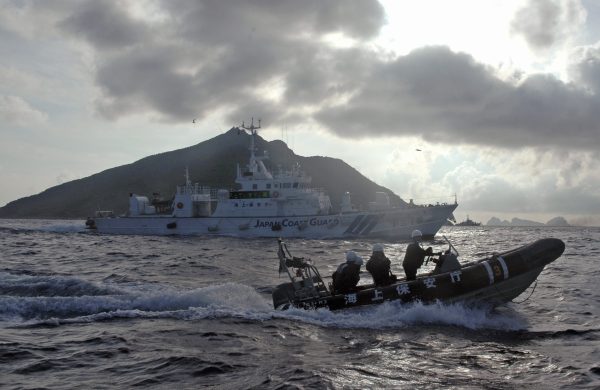
The primary security challenge for Japan today is China’s behavior over the disputed Senkaku Islands (known in China as the Diaoyu Islands).
In the fall of 1968, the United Nations Economic Commission for Asia and the Far East (ECAFE) noted the possible presence of immense deposits of oil and gas under the waters surrounding the islands. Subsequently, starting with a statement by the Chinese Foreign Ministry on December 30, 1971, Beijing began officially claiming the islands as Chinese territory.
In February 1992, China passed the Law of the People’s Republic of China on the Territorial Sea and the Contiguous Zone, with Article 2(2) defining the Senkaku Islands as “Chinese territory.” Later, in September 2012, it set up a baseline that surrounds the Senkaku Islands.
China not only claims territorial rights over the Senkaku Islands themselves, but in recent years has also become increasingly aggressive in the waters that surround them. China Coast Guard (CCG) vessels have routinely made incursions into the territorial waters around the islands, navigated through the contiguous zone, and approached or pursued Japanese fishing boats. In 2021, CCG vessels navigated through Japan’s contiguous zone a total of 332 days. That was second only to 2020, when a new annual record of 333 days was set. Moreover, CCG vessels approached or pursued Japanese fishing boats in the waters surrounding Senkaku Islands on 18 occasions in 2021, double the frequency of 2020.
It is important for Japan to sustain diplomatic efforts through a range of channels to convey to Beijing that causing a crisis over the Senkaku Islands would not be to China’s benefit. However, as the Russian invasion of Ukraine has made clear, diplomacy alone is unlikely to stop a determined leader of a major power. Whatever happens with the Senkaku Islands in the future, Japan will need to prepare to be able to respond appropriately and effectively.
Exactly what preparations are needed? In fact, there are a number of issues pertaining to Japanese security that must be promptly resolved.
If China were to launch a military takeover of the Senkaku Islands, as Russia has been trying to do in Ukraine, Japan would exercise its right to self-defense in accordance with international law and initiate defense operations based on Article 76 of the Self-Defense Forces Law in Japan.
However, if China were to try to take the Senkaku Islands without actual military action, Japan would find it difficult to initiate defense operations given the way the Japanese government has interpreted the conditions for doing so in the past. Tokyo has made the interpretation that ordering defense operations requires the “use of organized and planned armed force against Japan from outside.” At present, if the Chinese police or military were to land on the Senkaku Islands, the Japan Coast Guard, the Okinawa Prefectural Police, or certain other police organizations would treat it as a violation of the Immigration Control Law, taking legal action to arrest the perpetrators and initiating a criminal investigation.
Yet even though a Chinese landing on the islands would clearly be an infringement of Japanese territorial integrity by an external power, the Self-Defense Forces that are meant to protect Japanese sovereignty would not take action; rather, the response would be a police organization taking legal action. As such, what Japan can do under its current laws is limited in terms of efficacy.
Japan must allow its Self-Defense Force to respond to infringements that are not quite tantamount to the “use of organized and planned armed force against Japan from outside.” The Self-Defense Forces Law should be revised or a new law should be established to allow for new kinds of activities by the Self-Defense Forces.
Whichever course it takes, Japan must carefully consider the possible scenarios for the Senkaku Islands and be proactive so that it can respond to each scenario appropriately and effectively, as if the date of a Chinese invasion of the Senkaku Islands were approaching hour by hour. Depending on the situation, it could be necessary to initiate defense operations. Politicians have to make decisions at moments of crisis. Cabinet-level politicians have to rehearse the process that leads to ordering defense operations. It is also important to define beforehand exactly what situations constitute a crisis.
Japan Needs to Prepare for a Possible Senkaku Islands Crisis
Source: Frappler

0 Comments